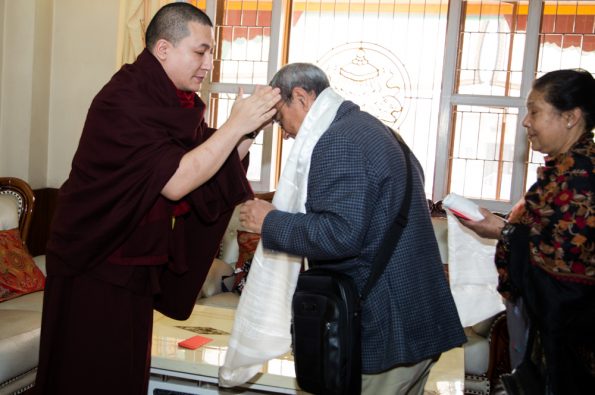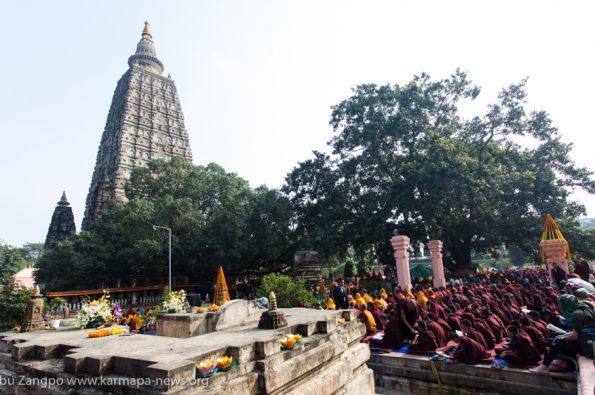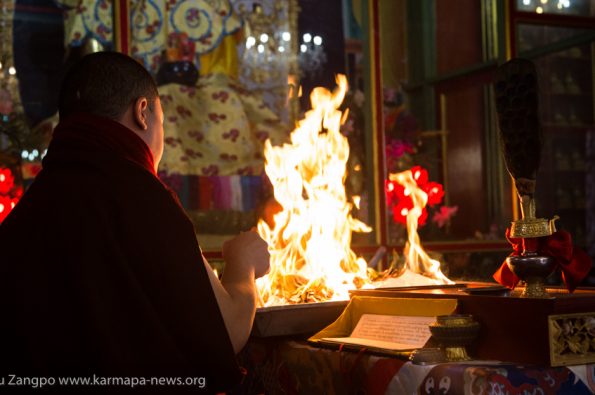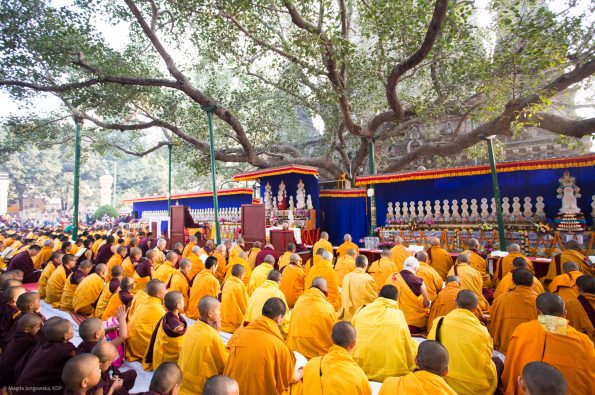Dilgo Khyentse Rinpoche Visited Gyalwa Karmapa
After the extensive celebrations on December 30 things were quieter in Bodhgaya on the next day. The Kagyu Mönlam went on at the Mahabodhi Stupa as usual, and whenever the Gyalwa Karmapa did not join in the recitations he received an endless stream of devotees who came to receive his blessing and guidance.
On the morning of this last day of the Western year some very important guests paid him a visit: Dilgo Khyentse Yangsi Rinpoche, Shechen Rabjam Rinpoche and several other tulkus and khenpos (scholars who have graduated from a higher Buddhist institute of learning) from Shechen Tennyi Dargyeling Monastery in Bodhnath, Kathmandu.
Shechen Rabjam Rinpoche is the seventh in the line of the Rabjam succession. He is the grandson and spiritual heir of Dilgo Khyentse Rinpoche, a very important meditation master. His grandfather raised him and began teaching him at the age of three, and he attended almost every single teaching, empowerment, and ceremony his grandfather presided over.
When his grandfather built the Shechen Tennyi Dargyeling Monastery in Nepal he named his grandson as the abbot even though he was still very young. The monastery has over 300 monks studying today and is one of the largest monasteries outside Tibet. Despite his young age at the time when he became abbot, Rabjam Rinpoche succeeded in creating a model monastery.
Dilgo Khyentse Yangsi Rinpoche was born in Nepal on June 30, 1993. When Dilgo Khyentse Rinpoche passed away, his close students requested Trulshik Rinpoche, his most senior and accomplished disciple, to find his incarnation. He had numerous dreams and visions that clearly indicated the identity of the incarnation as the son of Tsikey Chokling Rinpoche, the third embodiment of Chogyur Dechen Lingpa, himself the son of Tulku Ugyen Rinpoche, and Dechen Paldron.
In December 1995, Trulshik Rinpoche performed the ceremony of offering a name (Ugyen Tenzin Jigme Lhundrup), and robes to the young tulku. His actual enthronement took place at Shechen Tennyi Dargyeling Monastery in Nepal in December 1996 and was attended by thousands of students from all over the world.
Dilgo Khyentse Yangsi Rinpoche is being educated in the quiet of Bhutan under the guidance of Rabjam Rinpoche.
When the illustrious guests arrived they were immediately escorted to the Gyalwa Karmapa’s room where they exchanged silk scarves. Tea and refreshments were served, and the Karmapa and his visitors took time together for an extended talk.
Gyalwa Karmapa also gave a press conference which was attended by about 25 journalists representing some of the most important Indian media. Many of the questions asked were related to the current problems India is facing, such as terrorism, poverty and social tension. When asked to give some advice on how to deal with such problems, the Gyalwa Karmapa insisted on the importance of developing patience, loving kindness and compassion.
“If we focus our efforts inwardly and develop patience, loving kindness and compassion, this will have an effect on our environment. If out of a hundred or a thousand or a million individuals, one individual expresses deeper and greater understanding, naturally the surrounding, the people around that individual will take notice, and will think and ask questions… And naturally, if we can see that a person can change, a person can become more tolerant, more understanding, based on compassion, then naturally the circle will expand, will become wider and wider, and in time it will reach the whole million of individuals. That’s happened in the past many times, with the different religious leaders, not only Buddhist ones. There are many who have expressed great qualities of tolerance and understanding. And this does bring a lot of hope, because all of us have this potential.”
At the end of the conference once again the journalists received the Gyalwa Karmapa’s blessing and were given protection cords.




